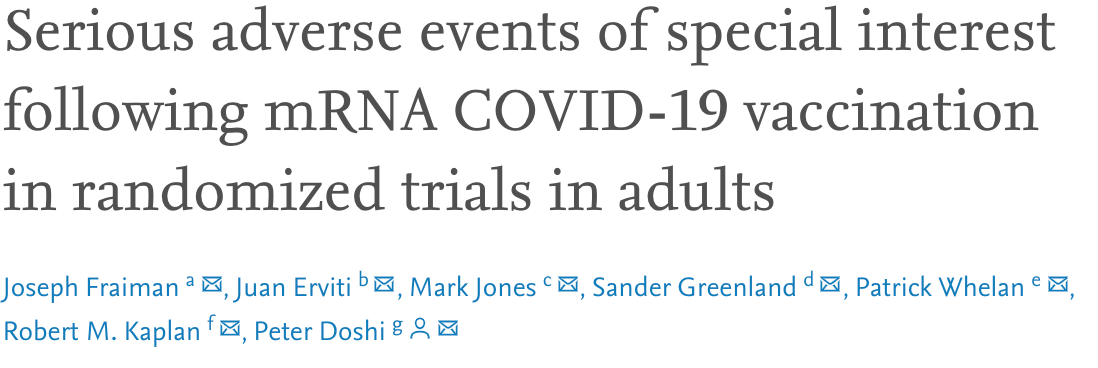One Serious Adverse Event Per Eight-Hundred Vaccinations
New Bombshell Covid Vaccine Study
One Serious Adverse Event Per Eight-Hundred Vaccinations
New Bombshell Covid Vaccine Study
A recent study published in the peer-reviewed journal Vaccine—known for publishing the highest-quality vaccinology research—contains bombshell findings about the safety of Covid vaccines.
Crucially, the authors found one serious adverse event for ever 800 mRNA vaccinated participants, orders of magnitude higher than the 1 to 2 per million reported for other vaccines.
The researchers conducted a secondary analysis of original data from Pfizer and Moderna’s phase 3 clinical trials, focusing on “adverse events of special interest (AESIs)” as listed by the Brighton Collaboration—a “global authority” on vaccine safety. As the authors write, this World Health Organization-approved priority list of adverse vaccine events hasn’t been used to examine side effects in COVID-19 vaccine trial data.
“The stunning finding was as follows: the risk of serious adverse events from the Moderna and Pfizer vaccine exceeds the benefit of reduction of COVID-19 hospitalisation”.
The stunning finding was as follows: the risk of serious adverse events from the Moderna and Pfizer vaccine exceeds the benefit of reduction of COVID-19 hospitalisation. In the analysis, Moderna caused higher adverse events than Pfizer, but both were elevated compared to the placebo arm.
“Higher risk of serious AESI was observed in the mRNA COVID-19 vaccine group relative to placebo in both the Pfizer and Moderna adult phase III trials, with 10.1 (Pfizer) and 15.1 (Moderna) additional events for every 10,000 individuals vaccinated,” the authors wrote.
The average risk difference across both vaccines was 12.5 serious AESIs per 10,000 individuals vaccinated. As the authors write, these results “raise concerns that mRNA vaccines are associated with more harm than initially estimated at the time of emergency authorization.”
One of the key differences between the authors’ analysis of the Pfizer trial and the Food and Drug Administration (FDA) analysis is that the FDA calculated the number of participants with serious adverse events (SAEs), whereas the authors calculated the total number of SAEs (many vaccinated participants experienced multiple SAEs).
Another difference between the two is the criteria for including participants. The FDA’s analysis (126 SAEs per 21,621 vaccinated participants) strangely included those with only one dose across a wide range of post-injection follow-up times. The researchers’ review used a “study population with median follow-up ≥ 2 months after dose 2 (minus 120 HIV-positive participants), of which 98.1% had received both doses.” They comparatively found 127 SAEs per 18,801 vaccine recipients.
“The FDA’s analysis of SAEs thus included thousands of additional participants with very little follow-up, of which the large majority had only received 1 dose,” the authors wrote.
The authors also highlighted the differential risk-reward propositions based on a variety of factors, including age, sex, and comorbidities. The calculus for younger, healthier, and previously infected individuals would “shift towards harm,” while older, more overweight, and vitamin D-deficient individuals would have more to gain from vaccination. The most common adverse events in the Moderna and Pfizer trials were “coagulation disorders.”
The authors are also honest about the limitations of their study, stating:
“First, Pfizer’s trial did not report SAEs occurring past 1 month after dose 2. This reporting threshold may have led to an undercounting of serious AESIs in the Pfizer trial. Second, for both studies, the limited follow up time prevented an analysis of harm-benefit over a longer period.”
The most conservative, minimalist conclusion one can draw from this study is that vaccines may not confer net benefit to everyone, and therefore, universal mandates were dangerous, unscientific, and unethical.
The most conservative, minimalist conclusion one can draw from this study is that vaccines may not confer net benefit to everyone, and therefore, universal mandates were dangerous, unscientific, and unethical. They led to marginalisation and systemic discrimination of the unvaccinated and untold preventable vaccine injuries among healthy people in particular. Not to mention all the economic, cultural, and political divisions that were exacerbated.
Prior to this study, numerous real-world case studies and informal analyses by observers indicated that vaccine risks exceeded benefits. Other data—advertised by governments and media organisations—pointed in the opposite direction.
However, this robust study, even if limited and flawed, has cast doubt on the indisputable religious truth that getting vaccinated is in everyone’s best interest. Unlike other analyses for which critics come after “fringe” and “conspiratorial” scientists, this study was led by epidemiologists working at prestigious institutions such as UCLA and Stanford. Notably, Sander Greenland, one of the leading epidemiologists and biostatisticians in the United States, co-authored the study.
When citing sources for one’s rational vaccine hesitancy (assuming a relatively young age and negligible risk factors), one need not reference blog posts or highly confounded real-world data. Greenland and colleagues have set a precedent for honest vaccine research, and a much more rigorous study needs to be conducted before making further extrapolations.








